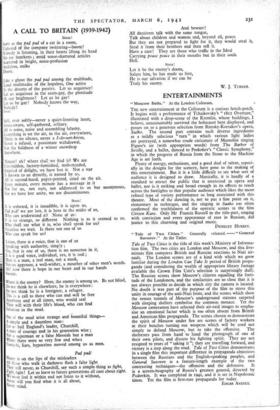" Tale of Two Cities." Generally released. — " General Suvorov."
At the Taller.
Tale of Two Cities is the title of this week's Ministry of Informa- tion film. The two cities are London and Moscow, and this five- minute film compares British and Russian reactions to Nazi air- raids. The London scenes are of a kind with which we grew familiar during the London Can Take It period of British propa- ganda (and considering the wealth of appropriate library footage available the Crown Film Unit's selection is surprisingly dull). The Russian scenes show Moscow's citizens equalling the forti- tude of the Londoners, and the similarities are so close that it is not always possible to decide in which city the camera is located. No doubt it was part of the purpose of the film to stress this unity in courage of the anti-Nazi front, and the scenes which show the ornate tunnels of Moscow's underground stations carpeted with sleeping shelters symbolise the common menace. Yet the Moscow cameramen have selected their air-raid images to empha- sise an emotional factor which is too often absent from British and American film propaganda. The scenes chosen to demonstrate the spirit of Moscow under fire are scenes of factory workers at their benches turning out weapons which will be used not simply to defend Moscow, but to take the offensive. The shelterers pass from hand to hand the photograph of one of their own pilots, and discuss his fighting spirit. They are not resigned to years of " taking it "; they are travelling forward, and victory is a step along the road. Tale of Two Cities demonstrates in a single film this important difference in propaganda objectives between the Russians and the English-speaking peoples, and General Suvorov is a feature-length example of the two
contrasting techniques—the offensive and the defensive. It is a screen-biography of Russia's greatest general, directed by Pudovkin. It was completed in 1941, and it is set in Napoleonic times. Yet the film is first-rate propaganda for today.
EDGAR ANSTEY.


























 Previous page
Previous page